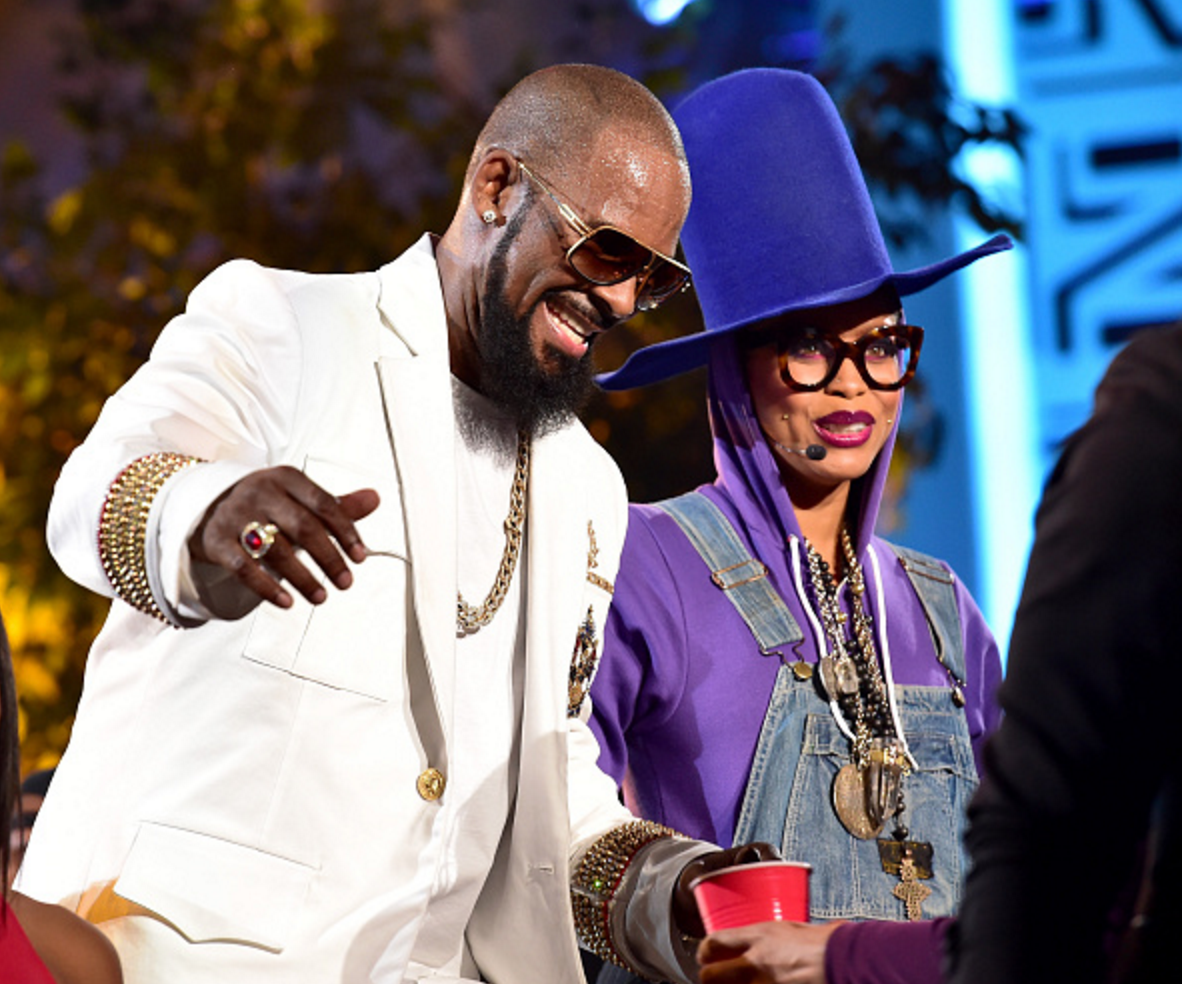We've Got to Stop Celebrating R. Kelly
Last weekend The Soul Train awards aired on BET and Centric. The ceremony, named for the long-running weekly broadcast that showcased the best in R&B and Soul music, was an unapologetically Black and Proud event filled with our most talented and treasured entertainers.
Erykah Badu hosted with the easy humor that makes her so irresistible. She was perfect up until a cringe-worthy moment toward the end of the show.
That R. Kelly continues to be invited on to major platforms like The Soul Train Awards on the premiere network for Black culture is shameful, that he is celebrated is disgusting.
R. Kelly is a monster, and we have to stop inviting him to things. He deserves no pedestals.
It is well-established fact that R. Kelly has preyed upon teenage girls for more than twenty five years. Not only is there an extensive public record of court documents, but at least two generations of native Chicagoans have stories of spotting Kelly lingering around his alma mater, Kenwood Academy, and various teenage hot spots seeking out sex.
Moreover, Kelly’s illegal marriage to 15-year-old Aaliyah in 1994 has become a well-known scandal. Aaliyah’s mother told the Chicago Sun-Times, “Everything that went wrong in her life began” after their relationship.
Kelly was indicted on child pornography charges in 2002 but acquitted in a 2008 trial largely because neither the alleged victim or her parents were willing to testify. More than 40 others took the stand to confirm that the girl in the video was the same 14-year-old.
In lawsuit after lawsuit, victims allege the same sequence of events. Kelly wooed them, made big promises, and cast them aside. Jim DeRogatis, the former Chicago Sun-Times reporter who broke the story, made it clear that these crimes are not just about a questionable age difference. “There was a trail of young women whose lives were ruined because of their relationships with R. Kelly,” he explained in a discussion of the case. Kelly systematically employed textbook abuser tactics to alienate the girls from their families and friends while he pursued them. One of the girls, Tiffany Hawkins, attempted suicide after he left her.
The attorney who represents a handful of the victims told Vulture that Kelly has evaded criminal charges because, “People don’t trust the legal system.” They don’t want to testify either.
Their fears are not unfounded. Any woman who came out publicly against R. Kelly would not be protected.
The lack of care shown to the adolescent girl coerced into sex acts on tape with R. Kelly is evidence of that. Widely circulated as entertainment in the early aughts, the sex tape/rape document was sold on street corners and in barber shops. Comedians like Dave Chappelle reduced the acts depicted therein to cheap punchlines.
It is much easier to laugh than to examine closely the things that bring us pleasure. Continuing to protect R. Kelly as a curator of happy feelings sends a clear message that the girls he preyed on, and all Black girls, really, are of no importance to us as a community.
The historical myths that have made Black men targets for radicalized violence cannot be justification for refusing to hold them accountable for predatory behavior. R. Kelly is a real rapist not a monster of D.W. Griffith’s imagining. Nor can we allow the preservation of Black Male Genius to prompt us to explain away his abuse as merely complexity or eccentricity.

Photo: Paras Griffin/BET
The delusions don’t stop there. In a 2004 issue of XXL’s Hip Hop Soul Magazine, he said “I’m the Ali of today. I’m the Marvin Gaye of today. I’m the Bob Marley of today. I’m the Martin Luther King, or all the other greats that have come before us. And a lot of people are starting to realize that now.”
In all of this, the girls R. Kelly raped are reduced to an obstacle that he’s overcome. They are no more than actors to build a narrative to support his triumph.
Return the focus to the girls. Kelly’s ephebophilia cannot be minimized as mistake of the past because these acts are always contemporary for those who’ve suffered most. They will continue to suffer because of our collective inaction.
There are rapists among us. They move freely, and for that, we’re all responsible. Many people in Kelly’s life, including his former manager, his brother, and various associates have made public and private statements about his predilection for young girls, but nothing has been done.
Black outlets are aiding and abetting the sanitization of R. Kelly’s memory. Venerated Black institutions need not prop up predators who are wealthy and famous when others are less revolting and equally deserving.
There is a particular hurtfulness that comes from knowing that Kelly’s return to prominence is not the result of ironic hipster misogynoir or tasteless white feminism but an acceptance by so many Black listeners.
Despite the fond memories so many of us have attached to R. Kelly's work, we cannot prioritize nostalgia over people.
Header photo: Ethan Miller/BET
Kimberly Foster is the founder and editor-in-chief of For Harriet. Email or Follow @KimberlyNFoster

No comments: